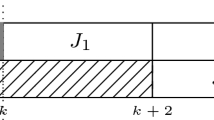A scheduling system is proposed and developed for a special type of flow shop. In this flow shop there is one machine at each stage. A job may require multiple operations at each stage. The first operation of a job on stage j cannot start until the last operation of the job on stage j - 1 has finished. Pre-emption of the operations of a job is not allowed. The flow shop that the authors consider has another feature, namely time lags between the multiple operations of a job. To move from one operation of a job to another requires a finite amount of time. This time lag is independent of the sequence and need not be the same for all operations or jobs. During a time lag of a job, operations of other jobs may be processed. This problem originates from a flexible manufacturing system scheduling problem where, between operations of a job on the same workstation, refixturing of the parts has to take place in a load/unload station, accompanied by (manual) transportation activities. In this paper a scheduling system is proposed in which the inherent structure of this flow shop is used in the formulation of lowerbounds on the makespan. A number of lowerbounds are developed and discussed. The use of these bounds makes it possible to generate a schedule that minimizes makespan or to construct approximate solutions. Finally, some heuristic procedures for this type of flow shop are proposed and compared with some well-known heuristic scheduling rules for job shop/flow shop scheduling.
Similar content being viewed by others
References
Aanen, E. (1988) Planning and scheduling in a flexible manufacturing system, Ph.D. Thesis, Faculty of Mechanical Engineering, University of Twente.
Aanen, E., Gaalman, G. J. C. and Nawijn, W. M. (1993) A scheduling approach for a flexible manufacturing system. International Journal of Production Research, 31, 2369–2385.
Cao, J. and Bedworth, D. D. (1992) Flow shop scheduling in serial multi-product processes with transfer and set-up times. International Journal of Production Research, 30, 1819–1830.
Garey, M. R. and Johnson, D. S. (1979) Computers and Intractability: a Guide to the Theory of NP-Completeness, Freeman, San Francisco.
Johnson, S. M. (1954) Optimal two- and three-stage production schedules with set-up times included. Naval Research Logistics Quarterly, 1, 61–68.
Kern, W. and Nawijn, W. M. (1991) Scheduling multi-operation jobs with time lags on a single machine, Working paper University of Twente, Holland.
Mitten, L. G. (1958) Sequencing n jobs on two machines with arbitrary time lags. Management Science, 5, 293–298.
Monma, C. L. (1979) The two-machine maximum flow time problem with series parallel precedence relations: an algorithm and extension. Operations Research, 27, 792–798.
Morton, T. E. and Pentico, D. W. (1993) Heuristic Scheduling Systems, with Applications to Production Systems and Project Management, John Wiley & Sons, New York.
Szwarc, W. (1983) Flow shop problems with time lags. Management Science, 29, 477–481.
Author information
Authors and Affiliations
Rights and permissions
About this article
Cite this article
Riezebos, J., Gaalman, G.J.C. & Gupta, J.N.D. Flow shop scheduling with multiple operations and time lags. J Intell Manuf 6, 105–115 (1995). https://doi.org/10.1007/BF00123682
Issue Date:
DOI: https://doi.org/10.1007/BF00123682




